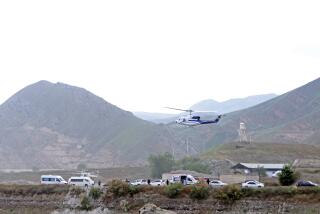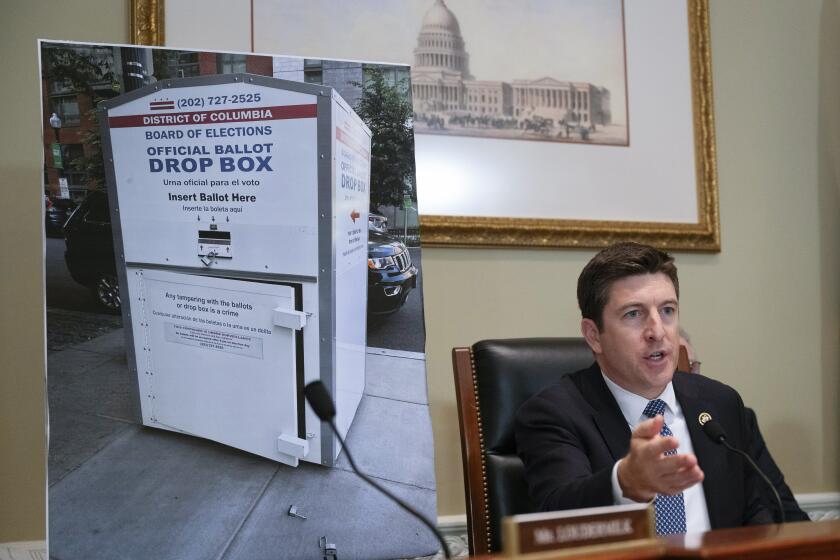Albanian Refugee Family Struggles in Limbo
As tens of thousands of his fellow ethnic Albanians rushed back into Kosovo last week, Besnik Vlashi peered into a cramped San Fernando Valley duplex, its dark interior as much a mystery as his own future.
Besnik and the rest of his family, airlifted to the United States in the past few weeks with about 7,600 other Kosovo refugees, are spending their days making a new life here: finding a home, learning English, getting jobs.
But although the peace agreement brokered earlier this month opened the doors for the return of refugees in and around Kosovo, it also marked the start of a new and upsetting period of uncertainty for the Vlashis and their fellow evacuees.
The refugees’ initial relief at arriving safely in America has been replaced by more ragged emotions, from frustration at the unrelenting newness of their lives to grief slowly emerging from long-buried memories.
“When we first came, we were trying to find out where we were and what was going on,” said Besnik, 17. “Now, the memories are building up.”
The uncertainty won’t be resolved any time soon. As the United Nations and aid agencies scramble to cope with refugees returning to Kosovo, they have yet to come up with any definitive plan to deal with the 88,000 refugees airlifted to 29 countries.
Further complicating the picture are the estimated thousands of refugees who still want to come to the United States, the peace accord unable to wipe out their memories of a homeland ravaged by slaughter and rape.
Several nations, including England and Germany, announced last week they will no longer accept Kosovo refugees, now that the bombing campaign is over.
As a result, some immigration experts predict that the U.S. may soon become the sole country accepting Kosovo refugees. At least 5,000 more are awaiting evacuation to the U.S., according to government figures.
“There is almost a daily debate going on discussing what to do,” said Panos Moumtzis, a Washington, D.C.-based spokesman for the Office of the United Nations High Commissioner for Refugees.
Refugee groups are pushing to make sure the door to the U.S. remains open, especially for refugees with medical problems too complex for the devastated health care system in Kosovo to handle, and for those severely traumatized by rape or loss of family members.
“We want to make sure that refugees in need of third-country resettlement have that opportunity,” said Leonard Glickman, executive vice president of the Hebrew Immigrant Aid Society, which, with the Jewish Federation of Los Angeles, helped bring the Vlashis to the U.S.
*
One thing is sure: Refugees like the Vlashis who chose to flee to the U.S. rather than remain in miserably crowded camps and private homes in Macedonia and Albania are at the bottom of the list for resettlement assistance.
Those in most urgent need of attention are the tens of thousands of internally displaced refugees who hid in the mountains and forests within Kosovo, lacking food or shelter.
Next are the hundreds of thousands who have spent months in crowded and unsanitary refugee camps, many of them within sight of Kosovo, a province of Serbia, the dominant republic of Yugoslavia.
Expatriated refugees like the Vlashis can’t expect governmental help to return home until next spring at the earliest, immigration and U.N. officials predict.
Technically, the refugees can leave of their own accord. But if they wait until the U.S. government declares Kosovo safe--a determination that could take months--they are guaranteed a free plane trip home.
If the refugees decide to stay in the U.S., they will be charged for the air fare to travel to this country, about $3,000 for a family of four. Despite the price tag, many experts predict that most of the refugees here will remain.
In part, that’s because of better services offered in the U.S. But it’s also because of a modern tradition in Kosovo Albanian culture to work abroad and send money home. Some estimate that as many as one in four ethnic Albanians work abroad.
“Common sense says that, once they get here and get jobs and kids in school, more and more will remain,” said Mark Franken, executive director for migration and refugee services for the U.S. Catholic Conference.
*
The Vlashis said they want to return, though they are prepared for a long wait. But frustrations abound. Chief among them is their own independence. After weeks of living with their host family, they feel they have become a burden--despite assurances to the contrary by their hosts, Bobbie and Steven Black of Calabasas.
They have had trouble finding an apartment for their family of six for around $1,000 a month. The high cost of housing and small units in the U.S. caught them off guard. They are not used to the idea of paying so much for so little, compared with what they can get for the same money in Kosovo.
“We feel like we’re being a burden,” said Fatime Vlashi, 47, the mother of the family, which also includes daughters Lumnie, 22, Ganimete, 21, and Fitore, 7. “We’d like to have a place of our own.”
Another source of worry is the father of the family, Hazir Vlashi, 47. He was separated from the family during the evacuation, though he is expected to arrive from Macedonia any day.
And finally, there are memories of what they have seen and experienced.
One daughter walked through snowy mountains for 15 hours to reach safety. Hazir Vlashi was severely beaten by Serbs, family members said. They have lost contact with numerous friends.
“We’re continually sad because of the situation,” Besnik said.
Refugee experts are expecting to see more psychological problems as time passes.
Unlike most refugees, who spent months and even years adjusting to their situations before coming to the United States, the Kosovo refugees were ripped from their homes and deposited abroad in a matter of weeks.
Processing the trauma will take time, experts say.
“Various psychological problems are expected to happen,” Glickman said. “It absolutely will present challenges.”
More to Read
Start your day right
Sign up for Essential California for news, features and recommendations from the L.A. Times and beyond in your inbox six days a week.
You may occasionally receive promotional content from the Los Angeles Times.






